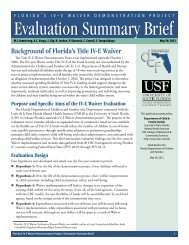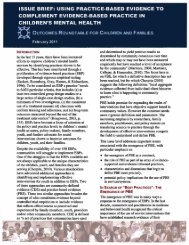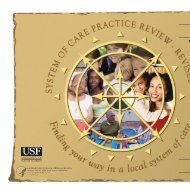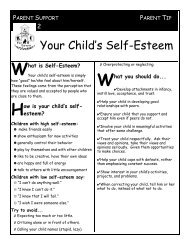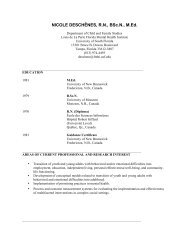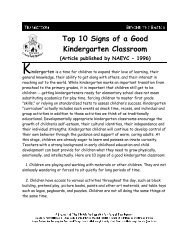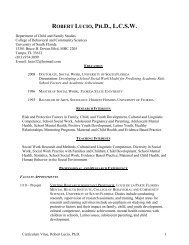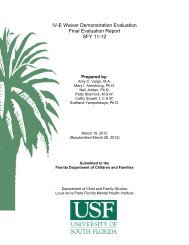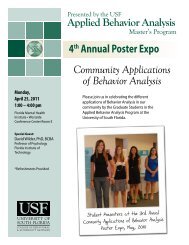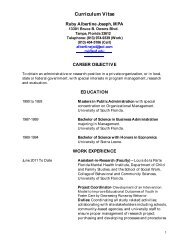The Early Learning Opportunities (ELO) Act - Child & Family Studies
The Early Learning Opportunities (ELO) Act - Child & Family Studies
The Early Learning Opportunities (ELO) Act - Child & Family Studies
You also want an ePaper? Increase the reach of your titles
YUMPU automatically turns print PDFs into web optimized ePapers that Google loves.
Evaluation of the <strong>Early</strong> <strong>Learning</strong> <strong>Opportunities</strong> <strong>Act</strong><br />
Reflections<br />
<strong>The</strong> <strong>ELO</strong> project implemented in Pinellas County, Florida, reflected a focused and persistent<br />
effort on the part of many individuals from numerous agencies to support the skill development<br />
of childcare providers to work effectively with young children in childcare settings. In a relatively<br />
short period of time, these partners were able to develop, deliver, research, and evaluate<br />
training for this skill development. This was a complex effort that required the collaboration of<br />
many stakeholders over a period of time, but was one that was worth the effort.<br />
This was certainly a first step toward developing a community training system for childcare<br />
providers that reflects research on the early literacy and social/emotional competencies needed<br />
for young children to become successful students. Specifically, this effort addressed these<br />
competencies by offering college coursework and instructional materials to the individuals<br />
providing their day-to-day care. <strong>The</strong>se training activities were reinforced by a coaching<br />
component, which facilitated transfer of training from the college classroom to the workplace<br />
setting. Finally, an optional parent support component was offered in an effort to involve families<br />
and provide additional, individualized support.<br />
This project not only educated childcare providers on the current research on promoting<br />
literacy skills and healthy social/emotional development in young children, the project used the<br />
current research to promote learning in childcare providers during the training. Thus, the<br />
coaching component was included to assure that participants had opportunities to observe,<br />
practice, and receive feedback on the new skills in their daily work places. This commitment to<br />
effective training methods helped to improve both the attitude and ability of childcare providers<br />
towards applying these evidence-based instructional methods in their classrooms or home<br />
daycares.<br />
<strong>The</strong> <strong>ELO</strong> project in itself is just a beginning because effective training is not a series of one<br />
time events; it is a lifelong process. <strong>ELO</strong> has created an opportunity for community members to<br />
continue the development of these training efforts as they appear to be promising practices,<br />
even if not yet entirely supported by empirical findings. <strong>The</strong> challenge remains, in that there is<br />
much to do to ensure continued training efforts to present childcare providers with opportunities<br />
to gain knowledge, skills, and competencies in these very critical areas. As revealed in this<br />
evaluation, training efforts such as this one can secure opportunities for children and their<br />
families to gain knowledge, skills, and competencies as well.<br />
Louis de la Parte Florida Mental Health Institute, University of South Florida – page 38




